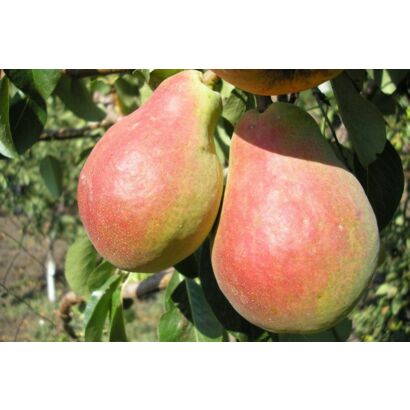Pear Favorite
Variety: not self-fertile
Fruits: from 180 gr., yellow
Maturation: medium late
Yield: up to 34-36 kg/tree
Zoning: Lower Volga, North Caucasus
Breeding: USA-USSR
| Selection | Russia |
| planting material | Pear |
Pear "Favorite" – improved by Soviet scientists and adapted to the Russian climate, the American variety "Klapp's Favorite"; (1860)
Dignity of the variety: high yield even on poor soils, drought and winter hardiness, commercial quality of fruits. Weaknesses: harvest for 7-9 years of planting, the need for cross-pollination, a tall tree.
Characteristics of the variety
Treefast growing, up to 5-6 m in height, with a pyramidal crown and a powerful trunk. The bark on the trunk is gray-brown, scaly, on the branches – smooth. The foliage is oval with a sharp end & nbsp; jagged edges. The flowers are white large, 6-7 pieces in the inflorescence.
Fruits egg-shaped, large. Average weight 180 gr., maximum – 252 gr. The skin of a ripe pear is smooth, tender, in a little noticeable point. The color is yellow with a red spot on the sunny side. Pulp – white, juicy. Taste – sweet with refreshing sourness. Harvested ripe fruits keep their marketable characteristics in heat for up to 15 days, they tolerate transportation well.
Yield «Favorites» depends on region and growing conditions. With proper care, up to 34-36 kg of pears are harvested from one tree, 180-300 centners per hectare. Pear ripening terms – end of July. At the slightest overripe, the fruits begin to crumble, so they begin to be removed from the trees a week before full ripeness.
Immunity. The plant can get sick with scab, fruit rot, rust. Subject to attack by leafworm, aphids, sawfly, codling moth, flower beetle, mining moth.
Growing conditions. Adult "Favorite" withstands frosts up to –30°C. However, young pear seedlings can freeze in winter, so the ground around the trunk must be covered with mulch, and the tree itself – snow. Since the variety is not self-fertile, for cross-pollination it is necessary to plant a tree 5-7 meters from other varieties of pears that bloom simultaneously with "Favorite".
Preparations
| Phase | Operation | Biopreparations | Comment |
|---|---|---|---|
| Pre-plant tillage | Disease treatment | SBT-Trichodermin TH82 | Fight against overwintering forms of pathogens 30-100 g/20 l of water per 1 weave |
| Pest control | SBT-Pecilomycin RM116 | wireworms. Soil pest control: larvae and adults of the May beetle, wireworm, mole cricket, etc. 100-150 g / 1 weave is applied by spreading |
|
| top dressing | SBT-Ekosoil | Stimulation of biological activity 50 g per 20 l of water / 1 weave |
|
| Organic fertilizer "TOR" | Main application in April Proportion 1:20 |
||
| root formation | Disease treatment | SBT-Fitolek BS26 | Soaking the roots of seedlings Prevention of the development of a wide range of fungal diseases 60 g/10 l for 50 pcs. seedlings |
| SBT-Trichodermin TH82 | Prevention of the development of a wide range of fungal diseases. Soaking the roots of seedlings 60 g/10 l for 50 pcs |
||
| Bloom | Disease treatment | SBT-Fitolek BS26 | Processing in the budding phase Prevention of powdery mildew, alternariosis, anthracnose, fomopsis, gray mold, curliness, septoria, tuberculariasis 40 g / 10 l per 1 weave |
| SBT-Trichodermin TH82 | Prevention of late blight, powdery mildew, root rot, gray mold, leaf spot 40 g/10 l per 100 m2 |
||
| Pest control | SBT-Actaro E | Processing in the budding phase Control of pests weevils, bronzovka, mites, aphids, sawflies. 10 g/10 l per 1 weave |
|
| top dressing | SBT-Biocomplex Amino | Stimulation of plant growth. Improvement of photosynthetic activity 20–30 ml/10 l per 1 hectare |
|
| Fruiting | Disease treatment | SBT-Fitolek BS26 | Prevention of powdery mildew, alternariosis, scab, gray mold, monilial and bacterial burns, clasterosporiasis, cytosporiasis, infectious drying of branches, bacterial cancer. During the period of fruit formation (3-4 treatments) at intervals of 20-25 days 40 g / 10 l per 1 weave 10-15 days before harvesting 40 g / 10 l per 1 weave |
| SBT-Trichodermin TH82 | During the period of fruit formation (3-4 treatments) at intervals of 20-25 days 40 g/10 l per 1 weave |
||
| After harvest | Disease treatment | SBT-Trichodermin TH82 | Autumn processing Reducing the stock of overwintering forms of pathogens spraying 120 g per 10–15 liters per 1 weave |



